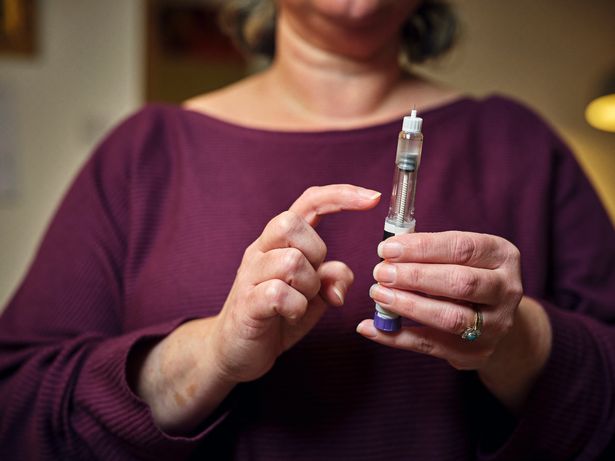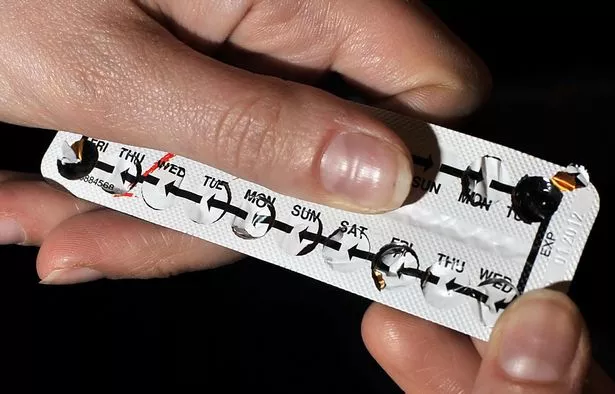Around 220,000 Brits are expected to receive Mounjaro through the NHS over the next three years – but what are the side effects of the weight loss drug? A range of side effects have been reported with Mounjaro use(Image: Getty Images)
A range of side effects have been reported with Mounjaro use(Image: Getty Images)
The NHS has revealed that GPs will be able to prescribe weight loss jabs from today.
The mass rollout of the drugs in England from Monday (June 23) will allow GPs to prescribe weight loss injections like Mounjaro for the first time.
Around 220,000 people are expected to meet the strict eligibility criteria to receive Mounjaro through the NHS over the next three years, as the health service says only those with the “greatest need” will be offered the drug at first.
Data suggests that around 1.5 million people in the UK are already taking weight loss jabs like Mounjaro and Wegovy, which may have been prescribed through specialist weight loss services. The drugs can also be bought privately from pharmacies.
 GPs in England will be able to prescribe Mounjaro, a weight loss injection(Image: Getty Images)
GPs in England will be able to prescribe Mounjaro, a weight loss injection(Image: Getty Images)
Olivier Picard, chairman of the National Pharmacy Association, said pharmacies expect to see “prescription volumes increase rapidly” after the NHS rollout of Mounjaro.
How does Mounjaro work?
Mounjaro is an antidiabetic that lowers blood sugar levels and slows down how quickly food is digested. It is usually delivered through a self-administered weekly injection.
Also known as tirzepatide, the drug works as an appetite suppressant by mimicking a hormone called glucagon-like peptide-1 (GLP-1) which is released after eating and typically makes people feel fuller for longer and therefore less hungry.
In clinical trials, people taking the drug – made by pharmaceutical company Lilly – lost 20 per cent of their body weight after 72 weeks of treatment.
 Mounjaro, also known as tirzepatide, makes patients feel fuller for longer(Image: Peter Dazeley/Getty Images)
Mounjaro, also known as tirzepatide, makes patients feel fuller for longer(Image: Peter Dazeley/Getty Images)
While the drugs have shown to reduce the risk of many obesity-related health problems, weight loss jabs have been linked to a number of potential side effects.
What are the potential side effects of Mounjaro?
A range of side effects have been reported with Mounjaro use. The UK’s drug watchdog, the Medicines and Healthcare products Regulatory Agency (MHRA), says that one in 10 patients using GLP-1 receptor agonists like Mounjaro experience gastrointestinal side effects, like nausea, vomiting, diarrhoea and constipation.
It says these are typically not serious, but may result in dehydration and potentially lead to other serious health complications such as kidney damage.
According to the Mounjaro patient booklet by pharmaceutical company Lilly, an “uncommon” side effect which may affect up to one in 100 people is acute pancreatitis. This is also known as an inflamed pancreas, and can cause severe pain in the stomach and back which does not go away.
 Gastrointestinal symptoms are a common side effect of taking weight loss medications(Image: Getty Images/iStockphoto)
Gastrointestinal symptoms are a common side effect of taking weight loss medications(Image: Getty Images/iStockphoto)
It also warns of severe allergic reactions as a “rare” side effect of the drug, causing symptoms like breathing problems, rapid swelling of the lips, tongue and throat with difficulty swallowing and a fast heartbeat, which require urgent medical attention.
Hair loss, dizziness, acid reflux and gallstones are also listed as “common” potential side effects of Mounjaro, which may affect up to one in 10 people.
According to Diabetes UK, patients taking other diabetes medications such as insulin or a sulphonylurea may also be at a higher risk of high or low blood sugar levels when taking Mounjaro.
Birth control warning to women taking Mounjaro
Mounjaro is not recommended for those who are pregnant or planning to get pregnant, breastfeeding or have certain health conditions, according to the NHS.
The MHRA issued an urgent alert earlier this month over the drugs, and warned women taking Mounjaro that they must use effective contraception such as the oral contraceptive pill, contraceptive implants, the coil and condoms.
 Women using weight loss jabs have been warned they must use effective contraception (Image: PA)
Women using weight loss jabs have been warned they must use effective contraception (Image: PA)
The regulator said it has received more than 40 reports relating to pregnancy among women using weight loss jabs, with 26 pregnancy-related reports for Mounjaro, according to the PA news agency.
For those taking the contraceptive pill and using tirzepatide drugs like Mounjaro, the NHS recommends using an additional method of contraception, such as a condom, for the first four weeks of treatment and for four weeks after each dose increase as the contraceptive pill may not be absorbed by the body during this time.
Anyone who gets pregnant while using the drugs should also stop taking the medicine. Women are also advised to continue using contraception for up to two months between stopping the medicine and trying to get pregnant.
